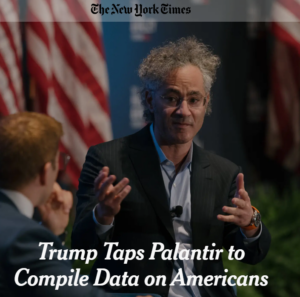The Future of Data and Governance: What the Palantir Contract Means for America

As we move deeper into the era of big data and enhanced surveillance, one company is poised to become a household name: Palantir Technologies. With historical ties to the political sphere, including the Trump administration, Palantir is not just another analytics company; it’s becoming a powerful player in the American governmental landscape. At Extreme Investor Network, we believe understanding this trend is crucial for investors and citizens alike.
A Centralized Database: What’s at Stake?
On March 2025, Donald Trump signed an executive order aimed at creating an extensive centralized federal database to house the personal data of every American citizen. Dubbed the “Information Silos” initiative, this order intends to streamline data sharing among federal employees, reducing bureaucratic inefficiency. The stakes are high as personal information—from social security numbers to medical records—will be compiled into a single, centralized database.
Why Palantir is the Chosen One
Palantir Technologies stands out in this initiative for several reasons. With its advanced data analytics capabilities and a history of government partnerships, it’s no surprise that the company was selected for such a monumental task. Palantir has garnered attention not only due to its technology but also its connections. Co-founder Peter Thiel’s backing of political figures like Donald Trump and J.D. Vance solidifies the company’s influence in shaping government data policies.
Investors should note that Palantir’s involvement could result in substantial government contracts, given that they’ve already received over $113 million under the current administration. The Department of Defense alone recently awarded the company an additional $795 million, highlighting the increasing reliance on its services.
Implications for Personal Privacy
The implications of a centralized database are profound. While proponents argue for greater efficiency in government operations, critics express grave concerns about privacy and security. The database will encompass various forms of sensitive data, raising the question: who truly controls this information?
Palantir asserts, “We act as a data processor, not a data controller.” This statement, however, doesn’t fully assuage concerns. With high-profile cases of government databases being hacked, the potential for misuse or abuse of this centralized system is considerable. How will citizens’ information be safeguarded, and at what cost?
A Glance at Global Trends
Globally, centralized databases have been a mixed bag. Countries like China have established extensive citizen databases linked to their Social Credit System. This level of surveillance raises alarms about personal freedoms and government overreach. In contrast, India and Brazil have their own systems, but none have sparked as much controversy as China’s abilities.
The risk of such a centralized system in the U.S. could mirror these concerns. The ongoing debate about balance—between security and privacy—will only intensify as more data is collated.
The Road Ahead: Surveillance State or Smart Governance?
As we embark on this new era dominated by data-driven governance, it’s unclear what role individuals will play. While supporters of Trump and Palantir argue for the benefits of efficiency and streamlined operations, others warn of surveillance and the erosion of personal freedoms.
At Extreme Investor Network, we see this as a pivotal moment in economic history, shaping the future of investments and governance. The prospect of digital IDs and a centralized financial system—like Central Bank Digital Currency (CBDC)—could redefine ownership and personal capital in ways we are only beginning to understand.
Conclusion: Knowledge is Power
As developments unfold, staying informed is essential. The new centralized database isn’t just a technological initiative; it presents a philosophical question about the nature of governance and human rights in America.
The coming years will test the boundaries between personal liberty and state security. As we navigate this complex landscape, it’s vital to engage, question, and advocate for policies that protect individual rights while embracing technological advancements.
Join us at Extreme Investor Network as we analyze these transformative trends and provide insights that empower our readers to make informed decisions in an evolving economic landscape.

